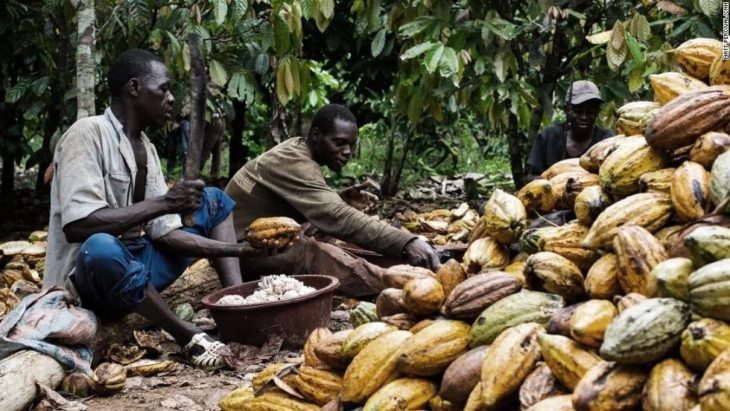The 2024 edition of the Chocolate Scorecard has revealed that cocoa farmer poverty remains largely unaddressed while chocolate companies continue to rake in billions in profits.
While briefing the media in Accra on the report of this year’s survey, the Executive Director of EcoCare Ghana, Obed Owusu Addai, stated that cocoa farmers are sinking deeper into poverty, although the “chocolate industry has the resources” to tackle the challenge.
Addai said “Forecasted revenue growth stands at 5.6%, surpassing global economic growth estimates of 2.6%,” adding that chocolate companies are “expected to generate around US$254 billion” in 2024 alone.
He called out companies for being adamant about the plight of millions of cocoa growers who live on less than US$1 per day, especially in West Africa.
The Chocolate Scorecard initiative is coordinated by Be Slavery Free in partnership with EcoCare Ghana and Mighty Earth, both environment advocacy organisations.
According to the coordinators, 63 chocolate companies and retailers participated in its latest survey, which rated companies on six key indicators: traceability and transparency, living income for farming families, child and forced labour, deforestation and climate change, agroforestry practices, and chemical and pesticide management.
83% of respondent companies recognised living income for farmers as a basic human right in line with the recently passed Corporate Sustainability Due Diligence Directive (CSDDD) by the EU.
“However, it is concerning that only six companies were paying 100% of their farmers a Living Income Reference Price,” observed the EcoCare boss.
Addai believes that the chocolate industry must continue to prioritise sustainability, fair labour practices, and environmental conservation while remaining hopeful that the CSDDD “will compel industry to begin realigning their purchasing practices to reflect the new paradigm.”
On traceability and transparency, the scorecard observed improvements in response to the European Union Deforestation Regulations (EUDR).
It noted that achieving full EUDR compliance remains a work in progress but highlighted the risk that “farmers may not receive the necessary support they require” as companies focus on their supply chains.
The 2024 Chocolate Scorecard recommended the need for governments, NGOs, companies, and consumers must work together to ensure that farmers are supported in meeting EUDR compliance requirements and are also compensated fairly for their efforts.
The report backed investment in national traceability systems such as the Cocoa Management System (CMS) developed by the Ghana Cocoa Board as the way to go.
The report describes as concerning the fact that a significant percentage of large chocolate companies are not yet deforestation-compliant, despite the majority of companies indicating that they have a policy or commitment to no deforestation.
It calls on companies to take concrete actions to ensure that their supply chains are free from deforestation, as the impact of deforestation on the environment, climate change, biodiversity, and local communities is significant.
It noted that child labour responses are increasing in effectiveness but observed that the road to elimination is still fraught with issues, mainly due to the lack of scale of programmes.
It recommended the scaling up of interventions to eradicate the menace in all supply chains, especially in addressing the root causes such as poverty that lead to its prevalence.
To realise total elimination, the 2024 Chocolate Scorecard report advocated that all stakeholders, including producer governments and the industry, must work together towards a common goal targeting wider coverage and inclusivity.
Environmental initiatives, such as climate targets, ending deforestation, and use of agroforestry, are gaining momentum, in part due to emerging legislation (particularly in the EU) requiring that companies take caring for the planet seriously.
But Obed Owusu Addai regretted that in Ghana, issues such as tree and land tenure are still posing significant limitations to the uptake of agroforestry in cocoa production.
He said, “There is a need for legislative and policy realignment to support the implementation of agroforestry.”
Senior Advisor for Cocoa Campaign at Mighty Earth, Samuel Mawutor, said that based on their demonstrated commitment, companies awarded scores under each thematic area.
Mawutor explained that in each area, the aggregated score places the areas and the company’s overall rating in 4 colours: Green – signifying leading in policy and practice, Yellow – progressing in policy and practice, Orange – needs improvement in policy and practice, Red – trailing in policy and practice.
Based on their cumulative scores, six companies emerged as winners of the coveted Good Egg Award of the 2024 Chocolate Scorecard initiative.
They are Original Beans, Beyond Good, Ritter Sport, Tony’s Chocolonely, Chocolate Makers, and Lidl & Plaids.
On the other hand, two companies, namely Krueger and Tesco, were given the Bad Egg Award for refusal to participate and lack of transparency in the 6 thematic areas.
For the coordinators, the Chocolate Scorecard initiative aims to promote transparency, accountability, and responsible practices within the industry by evaluating companies on social and environmental criteria.
- Chocolate Scorecard: Farmer Poverty Lingers Amid Chocolate Industry Profit Boom - March 26, 2024
- IWD2024: ITC, Dutch Embassy Celebrate Women in Cocoa - March 11, 2024
- AfDB Launches $520M Agro-Industrial Processing Zone In Nigeria - November 3, 2022
